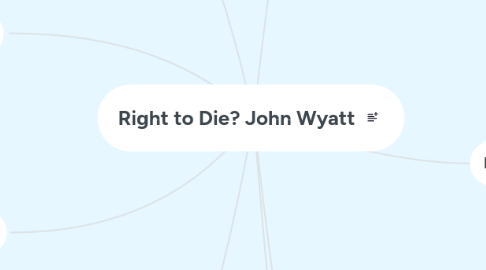
1. Changing Debates
1.1. Debate changed in last 20 years
1.2. 1990s debate mainly about people dying in terrible uncontrollable pain
1.2.1. Media full of tragic stories and painful death
1.2.2. ‘You wouldn’t let a dog die in agony so why do we let human beings die this way?’
1.2.2.1. Not very credible, can’t compare life of a human to a dog .
1.2.2.2. Some put dogs life above human life, others do opposite
1.3. Now
1.3.1. Not mainly about physical pain
1.3.2. Widely accepted most people with ‘expert palliative care, pain’ can be reduced and controlled and/or cured
1.3.3. Main issues ‘choice and control’ disease focus not cancer but ‘neurological’ like motor neurone disease, stroke etc
1.3.3.1. Cause loss of control and causes the loss of independence which some could say makes them loose their dignity
2. Rational Suicide
2.1. Nan Maitland founder of network for social housing ‘indication of an ongoing shift in social attitudes to suicide’
2.2. After her death her friends and colleagues received a letter shown in the image to the left
2.3. Wyatt: ‘Nan Maitland’s death represents a trend which is slowly growing in several countries’
2.4. Dignitas founder Ludwig Minelli-euthanasia activist believes in ‘death on demand’ argues ‘autonomy is a human right’
2.4.1. 'if you accept the idea of personal autonomy you can’t make conditions that only terminally ill people should have this right’
3. Human Pain
3.1. Wyatt talks about idea of ‘easy way out’ a ‘quick painless death’ seemingly seen as appealing and humane
3.2. Lord Carey argues we have duty of ‘Christian love’ to give option of quick and painless suicide for suffering at end of life
4. Compassion
4.1. Fashion Designer Jaspar Conran quoted Dignity in Dying website: ‘if our pets are hopelessly ill we have them put down to save them from pain and call that humane. If however our nearest and dearest are terminally ill and writhing in agony that drugs can’t help no more, we allow the law to insist that we do nothing.’
4.2. ‘argument from compassion seems simple and compelling’ wyatts opinion on the argument
4.3. What's wrong with this argument?
4.3.1. is killing the best practical and compassionate response that is available
4.3.2. Describes pro-euthanasia activists using ‘highly emotive and frankly manipulative language’ suggests 1000s of people are dying in agony but Wyatt says it doesn’t reflect expert opinions on palliative medicine
4.3.3. Compassion is ‘ambiguous’
4.3.4. Wyatt gives a scenario where he is in agony then he should be treated with compassion yet his safety and security would be rested on ‘your compassion’ but it may lead to end his life
4.3.4.1. o This is both a good and bad argument as yes if his life were in the hands of others and if euthanasia were legalised then his life could end yet if euthanasia were to be legalised it wouldn’t be in the doctors decision to end the life it’s the friends and family
4.3.5. ‘it is not necessary to kill the patient in order to kill the pain’
5. Sir Edward Downes
5.1. Died at Dignitas Clinic with wife Joan. Joan had pancreatic and liver cancer
5.1.1. Edward was 'elderly and frail' but not terminally ill
5.2. Paid £5000 each at Zurich to carry out euthanasia
5.2.1. Is it ethical to charge one for their life to be taken?
5.3. Downes parents said 'they wanted to die next to each other when they die. It is a very civilised way to end your life'
5.3.1. If his parents are ok with it, the why should it affect people?
5.3.1.1. Just because 2 individuals say it's ok doesn't speak for everyone else
5.3.1.2. Edward's relationship with his parents is not established in the book so it cannot be presumed they were close thus it is unknown whether his parents truly knew what he was thinking
5.4. Resons for Euthanasia
5.4.1. Parents were for it
5.4.1.1. However this does not make it socially acceptable and the relationship is unknown
5.4.2. It was what he wanted to do with his wife
5.5. Reasons against
5.5.1. There was evidence he ‘stood to gain financially’ from his decision to carry out medically assisted suicide
5.5.1.1. This raises the question, did he just do this to get out of his financial issue.
5.5.1.2. This means that if this is the case and if euthanasia were to be legalised then would people use it just to get out of paying their medical or other bills they may have?
6. Daniel James
6.1. Young rugby player England Youth Squad, 22 years old.
6.2. permanently paralysed from chest down 2007
6.3. tried to kill himself several times
6.3.1. Second overdose 2008, taken to hospital hospital psychiatrist noted ‘very angry and extremely hopeless’
6.3.1.1. Intensifiers used ‘very’ and ‘extremely’ further emphasises the pain he was in
6.3.1.2. Truly in pain arguably more than Edward
6.3.1.3. Is this case more morally justified in terms pf carrying out euthanasia later in Sept 2008?
6.3.1.4. Yes as he was unable to live life as he used to, unable to carry out his passions etc, he will never be the same however it could be the depression he was faced with invaded his soul thus he was blinded by the dark thought and maybe just needed more time
6.3.1.5. A concept like this does not take overnight to heal yet for some they could never heal from it, so it is a matter of was more time needed
6.3.1.6. A philosopher agrees with what his parents said which was even though they did try their best to dissuade him from wanting to carry out euthanasia in Sept 2008, they simply couldn’t so they went with him to do as he wished
6.3.1.7. Some could say that his parents just gave up on him others could say they spent thousands on equipment that could help him at home, so he could live life a little easier considering his circumstances
